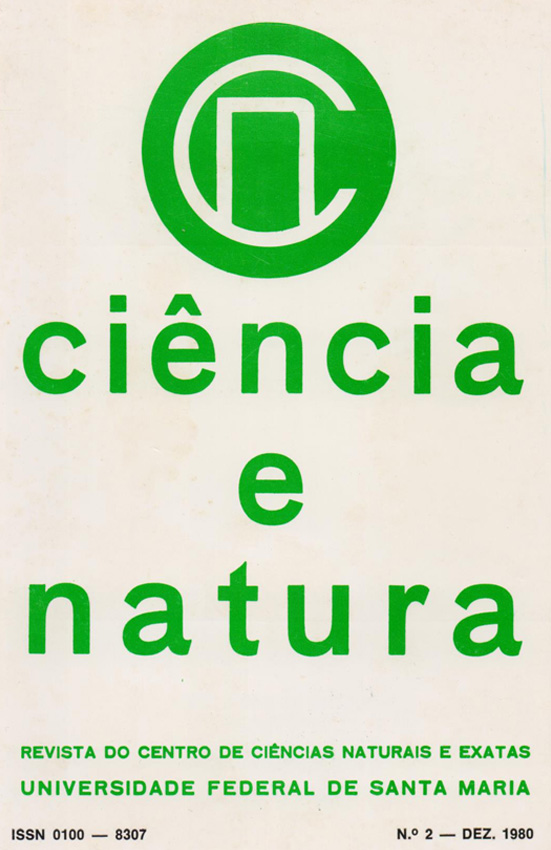Deforesting and agricultural horizontal expansion in the Toropi River Basin, RS
DOI:
https://doi.org/10.5902/2179460X24863Abstract
This work presents data on deforestating and agricultural horizontal expansion. The calculated data to the Toropi river basin was based on tematic maps that were made with basis on aireal pictures. The data show a significant decrease of the natural vegetation and reforestation, with an increase of agricultural areas. In the twelve years that they were studied (1964 to 1975) the subtropical woods, the groves and the areas with eucalyptus had their areas reduced in relative values in 25.51%, 56.03% and 35.62%, respectively, whereas the agricultural area had na increase of 73.75%. The increase in the cultivated áreas evaluated by relief compartment was larger in the downstream compartments (Central depression and plain edge), that from 1964 to 1975 had its agricultural areas increased by 82.38%. The agricultural area of the plains has also increased, though in smaller scale, equivalente to 60.62%.
Downloads
References
PRANDINI. F.L. et alii. Atuação da Cobertura Vegetal na Estabilidade das Encostas. Uma Resenha Critica. Instituto de Pesquisas Tecnológicas, São Paulo. II Congresso Brasileiro de Florestas Tropicais. Mossoró, RN. Publicação nº 1074, 1976, p. 13.
KRUROWSKI,G. Aspectos Geográficos da Erosão no Norte do Paraná. Boletim Paranaense de Geografia, Curitiba, n9 617, 1962 p.4 e 5.
TRICART,J. La Epidermis de La Tierra. Nueva Colección labor, Barcelona, Espanha, 1969. p. 93.
LA SALVIA,F. Identificação das Formas de Uso da Terra e Cobertura Vegetal do Rio Grande do Sul Através de Fotografias Áereas. Boletim Geográfico do Rio Grande do Sul. Secretaria da Agricultura, CEMAPA, Unidade de Geografia e Cartografia, ano l8 (16): 125-154, 1973.
Downloads
Published
How to Cite
Issue
Section
License
To access the DECLARATION AND TRANSFER OF COPYRIGHT AUTHOR’S DECLARATION AND COPYRIGHT LICENSE click here.
Ethical Guidelines for Journal Publication
The Ciência e Natura journal is committed to ensuring ethics in publication and quality of articles.
Conformance to standards of ethical behavior is therefore expected of all parties involved: Authors, Editors, Reviewers, and the Publisher.
In particular,
Authors: Authors should present an objective discussion of the significance of research work as well as sufficient detail and references to permit others to replicate the experiments. Fraudulent or knowingly inaccurate statements constitute unethical behavior and are unacceptable. Review Articles should also be objective, comprehensive, and accurate accounts of the state of the art. The Authors should ensure that their work is entirely original works, and if the work and/or words of others have been used, this has been appropriately acknowledged. Plagiarism in all its forms constitutes unethical publishing behavior and is unacceptable. Submitting the same manuscript to more than one journal concurrently constitutes unethical publishing behavior and is unacceptable. Authors should not submit articles describing essentially the same research to more than one journal. The corresponding Author should ensure that there is a full consensus of all Co-authors in approving the final version of the paper and its submission for publication.
Editors: Editors should evaluate manuscripts exclusively on the basis of their academic merit. An Editor must not use unpublished information in the editor's own research without the express written consent of the Author. Editors should take reasonable responsive measures when ethical complaints have been presented concerning a submitted manuscript or published paper.
Reviewers: Any manuscripts received for review must be treated as confidential documents. Privileged information or ideas obtained through peer review must be kept confidential and not used for personal advantage. Reviewers should be conducted objectively, and observations should be formulated clearly with supporting arguments, so that Authors can use them for improving the paper. Any selected Reviewer who feels unqualified to review the research reported in a manuscript or knows that its prompt review will be impossible should notify the Editor and excuse himself from the review process. Reviewers should not consider manuscripts in which they have conflicts of interest resulting from competitive, collaborative, or other relationships or connections with any of the authors, companies, or institutions connected to the papers.






